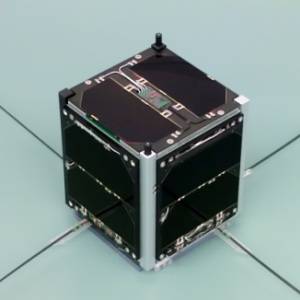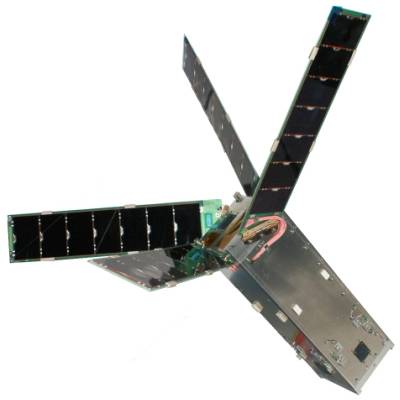KickSAT Telemetry 19-04-2014
The transmit interval is 2.5 minutes so I was only able to decode two packets.
1:Fm KD2BHC To CQ Via TELEM [18:27:16R] P4C,800,0,0,0, 1:Fm KD2BHC To CQ Via TELEM [15:22:16R] P4C,800,0,0,0,

KickSAT Telemetry 19-04-2014
The transmit interval is 2.5 minutes so I was only able to decode two packets.
1:Fm KD2BHC To CQ Via TELEM [18:27:16R] P4C,800,0,0,0, 1:Fm KD2BHC To CQ Via TELEM [15:22:16R] P4C,800,0,0,0,
![]() The Falcon 9 launch that would place Cubesats in orbit and bring a cargo vessel to ISS from last monday was scrubbed due to a leaking helium stage. Therefor KickSAT with the Sprite satellites was also not launched. The launch is postponed until Friday 18 april 2014.
The Falcon 9 launch that would place Cubesats in orbit and bring a cargo vessel to ISS from last monday was scrubbed due to a leaking helium stage. Therefor KickSAT with the Sprite satellites was also not launched. The launch is postponed until Friday 18 april 2014.
Latest information: Nasaflight.com
Tomorrow 22-03-2014 there will be a FUNcube-1 (AO-73) Continuous Transponder Test.
 FUNcube-1 (AO-73) will be commanded into continuous transponder mode for one or two orbits so we can assess the effect of lower power being radiated by the sat on the battery temperature. We expect the satellite to be put into full time transponder mode (aka amateur mode) during the first morning pass on Saturday, March 22 over the UK, at approximately 0930 UTC.
FUNcube-1 (AO-73) will be commanded into continuous transponder mode for one or two orbits so we can assess the effect of lower power being radiated by the sat on the battery temperature. We expect the satellite to be put into full time transponder mode (aka amateur mode) during the first morning pass on Saturday, March 22 over the UK, at approximately 0930 UTC.
Please upload as many telemetry frames as possible so the group can analyze the effect on the battery.
Below the Orbitron pass prediction for Western Europe based on CEST (UTC+1)
Time zone : UTC +1:00
Search period : 03-22-2014 00:00:00 - 1 days
03-22-2014 24:00:00
Time Satellite Azm Elv Mag Range S.Azm S.Elv
--------------------------------------------------------------------------
03-22-2014 10:31:06 AO-73 90.8 20.1 ? 1406 138.6 31.5
03-22-2014 12:07:53 AO-73 289.9 50.9 ? 764 167.1 38.4
03-22-2014 13:43:20 AO-73 310.5 8.6 ? 2075 197.5 37.8
03-22-2014 19:58:15 AO-73 45.7 6.0 ? 2387 284.4 -10.1
03-22-2014 21:33:29 AO-73 65.6 34.0 ecl 1077 305.0 -23.5
03-22-2014 23:09:55 AO-73 263.9 34.1 ecl 1078 330.1 -33.6
The full article can be found at the Amsat-UK website: FUNcube continuous Transponder Test
Despite earlier messages there are no signals received from Delfi-n3Xt. It seems that the signals that where believed to be Delfi-n3XT where signals from Delfi-C3. Below a message I received from Jasper PC4JB.
 Unfortunately, we have not heard anything from Delfi-n3Xt since Thursday 20/02 after our transponder test. During the transponder test we could hear our side beacon at 145.870 MHz and we were still able to switch back to normal transmission an back to transponder again (and also received the beacon the second time). Nothing seemed to be wrong, except for the transponder itself not properly working. The satellite was supposed to return to nominal operations in the next orbit.
Unfortunately, we have not heard anything from Delfi-n3Xt since Thursday 20/02 after our transponder test. During the transponder test we could hear our side beacon at 145.870 MHz and we were still able to switch back to normal transmission an back to transponder again (and also received the beacon the second time). Nothing seemed to be wrong, except for the transponder itself not properly working. The satellite was supposed to return to nominal operations in the next orbit.
We think that a hardware failure occurred either at the second half of the transponder orbit or during the mode switch. Since Friday we have made many attempts to revive the satellite. Since we have an independent radio, there was (and still is some) hope to get the satellite back in transmission. There are however a few points were common mode failures could occur: the phasing circuitry which connects both transmitters and an I2C buffer at the main bus side. We do however still have some hope that only one radio has failed and that we might still be able to command the satellite to use the other. Since all trivial command schemes did not work, next week we will only focus on a specific test to turn the transmitter on for a brief moment. During the weekend we saw some narrow band signal at 10 kHz below 145.870 MHz (+/- Doppler), which might potentially be related to the local oscillator. If we can reconstruct this a few times and clearly correlate this to Delfi-n3Xt (we do have a lot of intermitting noises sources in the neighborhood) we at least know the OBC and one radio is still working and we can commence to next steps.
We appreciate everyone’s help to listen to Delfi-n3Xt to see if there is still some signal left. I think the best changes (besides Delft passes in which we try to command) are when the satellite comes just out of eclipse and is supposed to startup one of the transmitters. Please note that it has become very crowded with CubeSats lately, so any signals which are off in frequency (except for the -10 kHz tone), have a very different bandwidth and/or Doppler shift are very likely to be other satellites in the neighborhood. Today we had for instance Delfi-C3 almost perfectly aligned sending at the same frequency. Delfi-n3Xt will only transmit at about 145.870 MHz.
[PE0SAT Thanks Delfi-n3XT ground station for the above information]
Coming, Delfi-n3XT Linear Transponder tests

We are going to test the transponder functionality of Delfi-n3Xt this week. I have to be honest that this functionality was implemented last minute on the satellite and was only tested briefly in a non-representative setup. I therefore estimate the chance that it will work at 50/50.
Our first series will be at:
After a few initial tests, and provided that it works, you are free to use the transponder for communication. We will leave it in this mode for the remainder of the sunlit part of the orbit, so only in Europe and Africa it is possible to use this mode for now. If successful we will turn on the transponder more often and for longer periods of time such that everyone can enjoy it.
Frequency:
Uplink 435.530 – 435.570 MHz LSB Linear transponder
Downlink 145.880 – 145.920 MHz USB Linear transponder (inverting)
DELFI-N3XT 1 39428U 13066N 14038.63217054 .00002453 00000-0 43939-3 0 699 2 39428 97.7772 111.8003 0129782 303.2748 55.6102 14.62338302 11392
Source: PC4JB, Jasper Bouwmeester, Delfi Nanosatellite Program Manager